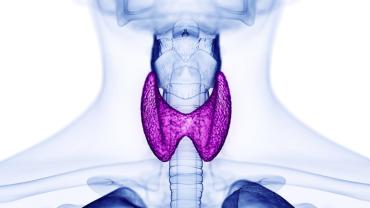
The thyroid gland plays a critical role in metabolic rate, growth and development, and the function of many body systems, such as cardiovascular, musculoskeletal, and gastrointestinal. The most prevalent form of hyperthyroidism is Graves’ disease (GD), an autoimmune condition involving the formation of activating thyrotropin-receptor antibodies that induce thyroid hormone overproduction. The pathophysiology of GD has been associated with chronic inflammation, oxidative stress, and DNA damage. Certain vitamins and minerals have been recently studied for their potential immunomodulatory support and role in promoting antioxidative status and a healthy inflammatory response.
Selenium is an essential trace element that has been shown to support healthy thyroid hormone metabolism. It may also support antioxidant status and a normal immune response. Clinical studies also indicate that supplementation with selenium may support healthy levels of antibodies associated with autoimmune thyroiditis. Vitamin D may also support immune health; low vitamin D levels have been associated with an increased risk of certain autoimmune thyroid conditions.
A recently published controlled pilot study by Gallo and colleagues investigated the potential efficacy of selenium and vitamin D supplementation in individuals (n=42) newly diagnosed with GD with low serum levels of circulating calcifediol and selenium. All participants received medication for GD according to the standard of care. The treatment group also received 100 µg of selenium daily plus an amount of cholecalciferol based on individual baseline serum values for 180 days. The primary outcomes assessed include parameters related to thyroid and immune health.
Study results indicate that individuals receiving vitamin D and selenium experienced improvements in certain aspects of immune and thyroid health. The treatment group was observed to have higher amounts of T regulatory (Treg) cells at the study terminus when compared with placebo. Treg cells are responsible for helping to control autoreactive immune cells and may help prevent certain aspects of autoimmune disease progression. Furthermore, decreases in certain natural killer (NK) cells, including CD56brightNK cells, were observed in the treatment group. While the full mechanism of NK cell activity in GD is still being elucidated, NK cells are thought to contribute to both the innate and adaptive immune responses, produce specific immunoregulatory cytokines, and contribute to immune cell signaling. Certain NK cells, particularly CD56brightNK cells, have been observed in higher amounts in individuals with GD when compared to healthy volunteers.
While more robust clinical research is needed, evidence suggests that adequate selenium and vitamin D may help support thyroid health and a normal immune response. Selenium and vitamin D may also promote antioxidative status, immune health, and a normal response to inflammation.
By Dr. C. Ambrose, ND, MAT